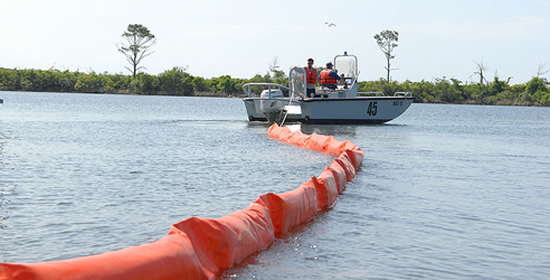I wanted to provide an update on the federal government's all-hands-on-deck response to the oil spill in the Gulf Coast from day one –coordinated every step of the way with our many state and local partners. Today, I'm traveling to Biloxi, Mississippi and Pensacola, Florida with Secretary of Commerce Gary Locke to inspect response efforts first hand. Last week, I was in Louisiana with Secretary of the Interior Ken Salazar and Environmental Protection Agency Administrator Lisa Jackson. And on Sunday, President Obama visited the region, meeting with local fishermen and surveying the site.
In the days and weeks ahead, the Administration will continue to do everything we can, working closely with our state and local partners, non-governmental organization's (NGO's) and others to ensure the efficient deployment and coordination of vital response assets, personnel, and equipment. Currently, more than 10,000 personnel and thousands of volunteers are responding to the spill to protect the shoreline and wildlife – and we expect that number to grow further as National Guard personnel are activated in Alabama, Florida, Louisiana and Mississippi. Nearly 270 vessels are responding on site, including skimmers, tugs, barges, and recovery vessels to assist in containment and cleanup efforts – in addition to dozens of aircraft, remotely operated vehicles, and multiple mobile offshore drilling units. We are deploying hundreds of thousands of feet of boom to protect the shoreline and using chemical dispersants and controlled burns to contain the oil at and below the sea surface. We've established 10 staging areas along the Gulf Coast with equipment and resources ready to respond and stood up three regional command centers in Louisiana, Alabama and Florida. And we've been in close communication with the state and local elected officials from the five Gulf Coast states who are on the ground and integrated into the command centers to ensure consistent coordination throughout the response.
We're also overseeing the efforts of British Petroleum, the Responsible Party, to ensure they're doing everything possible to stop the leaks and reimburse the communities, individuals and businesses impacted by the spill. To file a claim, call 1-800-440-0858 today.
I want to thank all of the dedicated men and women on the ground and at sea in the Gulf region – particularly the U.S. Coast Guard personnel – for their swift, tireless work responding to this incident. While we are facing a constantly evolving situation the public should know that the federal government – from President Obama to the Departments of Defense, Commerce, Interior, the Environmental Protection Agency and other agencies, and thousands of Coast Guard personnel throughout the Gulf – is doing everything in its power to limit the spill's environmental, economic and public health impacts.
Janet Napolitano
In the days and weeks ahead, the Administration will continue to do everything we can, working closely with our state and local partners, non-governmental organization's (NGO's) and others to ensure the efficient deployment and coordination of vital response assets, personnel, and equipment. Currently, more than 10,000 personnel and thousands of volunteers are responding to the spill to protect the shoreline and wildlife – and we expect that number to grow further as National Guard personnel are activated in Alabama, Florida, Louisiana and Mississippi. Nearly 270 vessels are responding on site, including skimmers, tugs, barges, and recovery vessels to assist in containment and cleanup efforts – in addition to dozens of aircraft, remotely operated vehicles, and multiple mobile offshore drilling units. We are deploying hundreds of thousands of feet of boom to protect the shoreline and using chemical dispersants and controlled burns to contain the oil at and below the sea surface. We've established 10 staging areas along the Gulf Coast with equipment and resources ready to respond and stood up three regional command centers in Louisiana, Alabama and Florida. And we've been in close communication with the state and local elected officials from the five Gulf Coast states who are on the ground and integrated into the command centers to ensure consistent coordination throughout the response.
We're also overseeing the efforts of British Petroleum, the Responsible Party, to ensure they're doing everything possible to stop the leaks and reimburse the communities, individuals and businesses impacted by the spill. To file a claim, call 1-800-440-0858 today.
I want to thank all of the dedicated men and women on the ground and at sea in the Gulf region – particularly the U.S. Coast Guard personnel – for their swift, tireless work responding to this incident. While we are facing a constantly evolving situation the public should know that the federal government – from President Obama to the Departments of Defense, Commerce, Interior, the Environmental Protection Agency and other agencies, and thousands of Coast Guard personnel throughout the Gulf – is doing everything in its power to limit the spill's environmental, economic and public health impacts.
Janet Napolitano

